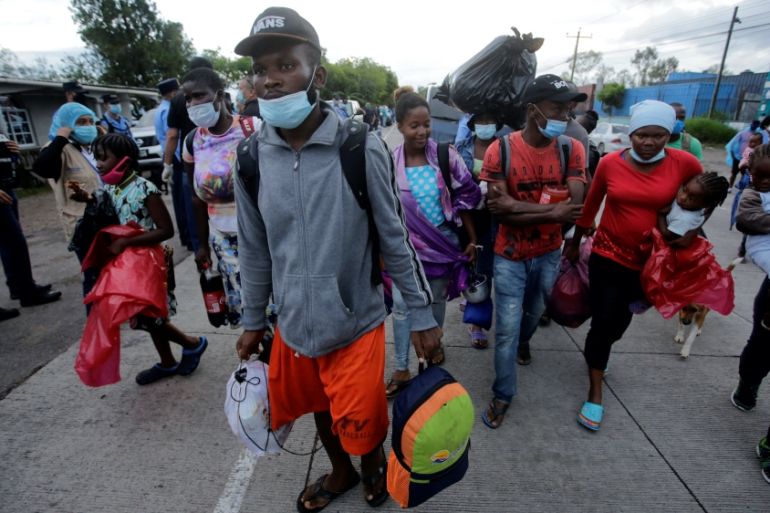Without safe migration, economic recovery will be limited
We cannot recover from the coronavirus economic crisis without relaunching migration safely and universally.

COVID-19 has created an unprecedented global health crisis. But with more than 50,000 travel restrictions in more than 200 countries, an equally unprecedented mobility crisis is emerging. The global system of mobility and travel has been returned to its factory settings. A privilege that so many of us take for granted, and others struggle to access, has been temporarily withdrawn. How – and when – we decide to reboot it will be critical to the future health of our populations, but also the future economic and social health of our countries.
The United Nations secretary-general, Antonio Guterres, recently highlighted that people on the move find themselves particularly vulnerable to the effects of the crisis. While the organisation I lead, International Organization for Migration (IOM), is focused on the immediate needs of those migrants and communities most affected by the pandemic, we are also reflecting on the long-term implications of this dramatic suspension of movement.
Keep reading
list of 4 itemsUK police arrest three over deaths of five people in English Channel
Children among 16 dead after asylum-seeker boat capsizes off Djibouti: UN
Five people die in attempt to cross English Channel to the UK
The current political, social and economic reaction to the virus is volatile. At the onset of the outbreak, governments shut borders in near unanimity. But beyond this, their reactions have diverged massively and haphazardly. In some countries, public services have been extended to undocumented migrants on the understanding that, just as viruses do not discriminate, neither can governments. In other parts of the world, rapid returns and expulsions of migrants are overwhelming countries of origin which are unprepared to support sudden, sometimes large-scale, arrivals.
The broadening scope of possible responses – both positive and negative – makes it difficult to identify where the new political equilibrium will settle when the fog of the pandemic itself lifts.
But some interesting convergence is emerging.
Much of the public debate in recent years – in Europe, as elsewhere – has centred on the value of skilled migrants. The unfortunate corollary of this has been an often-public rejection of unskilled migration. The current crisis, however, has driven home the “essential” nature of migrant labour, regardless of skill. We have seen how vital those who deliver food, clean public spaces, and provide domestic care have been in holding our societies together.
Indeed, a number of countries have prolonged visas and work permits, exempted seasonal workers from travel restrictions, and extended the right to work to asylum seekers in order to fill critical gaps in the workforce, a welcome antidote to the negative discourse around migration in Europe and elsewhere over the past several years.
Looking further ahead, this appreciation for the role of mobility will be important to retain. Researchers in Australia, for example, are pointing to a projected shortfall in immigration numbers as a result of the travel shutdown, which they warn could cripple Australia’s economic rebound.
The predicted economic recession will not only deeply affect migrants but also the global and regional patterns of mobility to which we have become accustomed. Geographic proximity and trust will be more important than ever for states – with an emphasis on “local” travel – and there is a risk that future mobility becomes two-tracked or two-speed based on national health concerns, placing those countries and individuals perceived to be at highest risk at a disadvantage. For example, if the health infrastructure of one country is seen by another as subpar, or COVID-19 testing fees at an airport are too steep, many will be excluded from travel or entry.
If we are unable to relaunch migration and mobility safely – and universally – the world’s ability to recover from economic recession will be limited. This is the paradox facing governments today. Health concerns have driven restrictions in movement, but there will be no sustainable recovery without trade and mobility, without reopening borders in a smart and safe way.
Threats such as terrorism have affected travel before. But states are now facing an invisible enemy, albeit carried with benign and unwitting intent. States and regions will now need to find a new balance between health concerns and the need for mobility. This means health-proofing border management systems without jeopardising the social and economic potential that migration holds or marginalising specific groups.
We can take cues from previous crises. The 9/11 attacks taught governments how to assess and incorporate new risks flexibly, and without shutting down entirely. The recent Ebola crises have reinforced the value of preventive infrastructure at borders, and the importance of contact tracing, but also the need to balance the opportunities and risks of surveillance and avoid social polarisation. The 2008 economic recession brought home the need to build community cohesion and identity, including for migrants, or risk deep and paralysing political rifts.
The COVID-19 pandemic has laid bare the dangers of persistent inequality in our societies, particularly for migrants and those citizens who struggle at the margins. While we go about the consuming work of mitigating the pandemic’s large-scale impacts and reestablishing human mobility, we should seize the opportunities ahead of us to address critical protection gaps, from social protection safety nets to public health access.
Just as we have realised that migration is a critical part of our economies and societies, it is important to recognise that inclusive migration is not just good for migrants, but a public good which will benefit all of us. Our recovery can leave no one behind as we get moving again.
The views expressed in this article are the author’s own and do not necessarily reflect Al Jazeera’s editorial stance.
